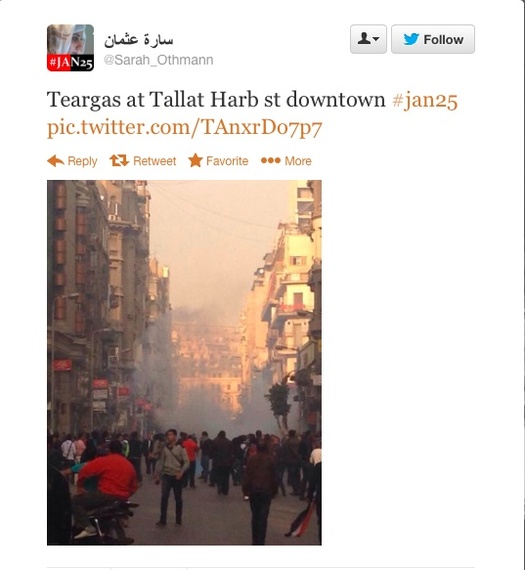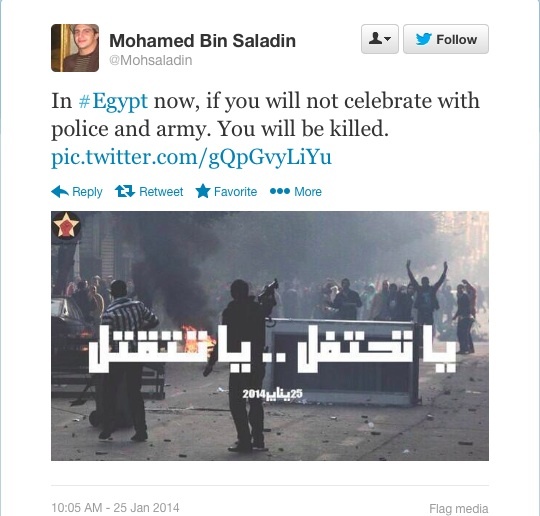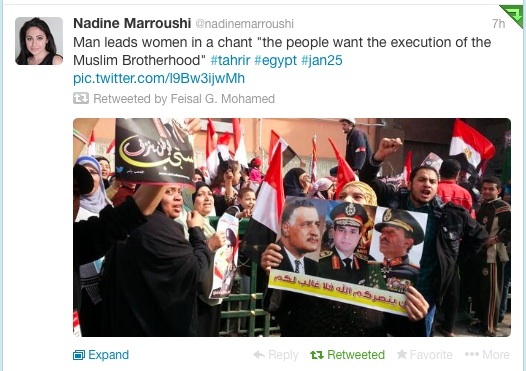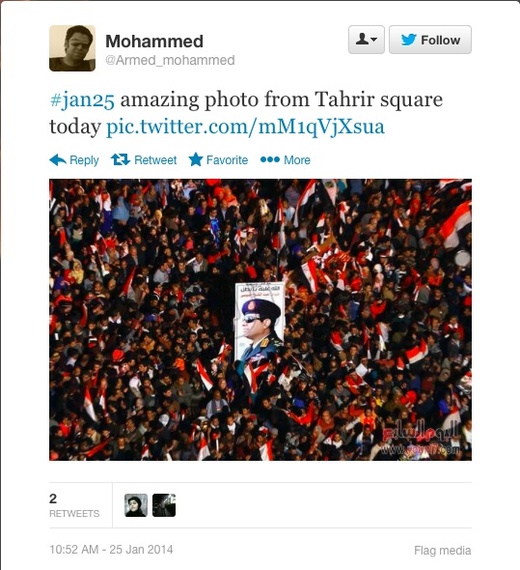There's something of a pattern in Jehane Noujaim's excellent documentary on the Egyptian Revolution, The Square: the young revolutionaries who are the heroes of the film have all of the energy driving the ouster of Hosni Mubarak, but an older generation of activists is deeply suspicious of an alliance of convenience with the army. Hossam Abdalla, father of the actor Khalid Abdalla, tells his son in a video call that the revolution served the army's interests in preventing Gamal Mubarak from becoming president: the younger Mubarak is not a military man, and cultivated ties with Egypt's business elite rather than the generals. In a very prescient remark, the novelist Mona Anis anticipates the result of continued political unrest: "I am so fucking scared of the moment a lieutenant or a piece of shit brigadier or something will say 'Enough of this rubbish, we are back to military rule completely.' It is in their interest that this disintegrates into chaos. It is in their interest to say 'OK, you people, enough: Law and Order.'"
We can now put a name to Anis's hypothetical "piece of shit": General Abdel Fattah al-Sisi. Since the military forced Mohamed Morsi out of the presidential palace on July 3, Sisi has led a ruthless crackdown on all obstacles to absolute military authority. Much of this has been focused on the Muslim Brotherhood in what official news agencies have styled a "War on Terrorism." This has largely entailed a revival of the old Mubarakite tactics for repressing the organization: their leaders have been jailed (again), the Brotherhood are banned from forming political parties (again) and their supporters have been variously detained, beaten, tortured and killed (again). Some Morsi supporters are undoubtedly guilty of perpetuating violence, but we should notice two things: 1) there is no evidence connecting that violence to the leadership of the Muslim Brotherhood or its Freedom and Justice Party; and 2) those elements resorting to violence have engaged in guerilla attacks, rather than terrorist attacks, targeting the security and military apparatus and not civilians.
Most importantly, we must emphasize that this is not just a military assault on the Brotherhood: it is a military assault on all forms of dissent. The military-backed government passed a law effectively making all forms of street protest illegal. Leaders of the revolutionary youth group the April 6 Movement have been jailed and are the subject of trumped-up charges. The activist blogger Alaa Abd al-Fattah has been jailed and is the subject of trumped-up charges. The professor of political science and liberal leader Amr Hamzawy is the subject of trumped-up charges. The professor of political science Emad Shahin is the subject of trumped-up charges. If the military is returning to old strong-arm tactics against the Islamists, it is also using the old regime's tactic of making Egypt a country hostile to smart, energetic people who might offer an alternative to totalitarianism.
The new-old regime has also adopted a more isolationist stance toward the West, as typified by these recent unlawful detentions of British, German and American nationals. Taken with the view that the West supported Morsi, the army has cozied up to the oil-producing Gulf States, who have rewarded them to the tune of 12 billion dollars. There seems little chance now for the United States or EU to broker an end to the bloodshed.
The revolution's old hashtag, #Jan25, has been active today, though for all the wrong reasons. Rather than a celebration of democracy, we find reports of army violence, and officially reported death tolls.
Tahrir Square, the symbolic epicenter of the revolution is in the hands of Sisi's supporters, who are showering the strongman with adulation.
Placards now often place Sisi in a line of pharaohs including Nasser and Sadat, in a way that reflects the growing sentiment that he is likely to make a run for the presidency. Even if he does not, he and the army will back a suitably sympathetic candidate. Judging by this fawning profile in the official newspaper Al-Ahram, Amr Moussa, who chaired the committee tasked with redrafting the constitution, may play a large part in the new order, abandoning completely his alliance with more liberal forces. Moussa has now fully earned the title given to him in Tahrir Square three years ago: "feloul!" (Literally "scraps," a term of derision for cronies of the old regime).
January 25 is now most known as the day when the revolution of 2011 was launched. The date was not chosen at random: it was intended roughly to coincide with the birthday of Khaled Said, who was beaten to death in June 2010 by plainclothes police officers. Today the perpetrators of state violence have been feted as national heroes. Tahrir Square is no longer the heart of a peaceful movement for democracy and social justice. It is the heart of a dispiriting public embrace of jackbooted authority. But the generals might yet overplay their hand, as the Brotherhood did before them, and find the love affair to be short-lived.






